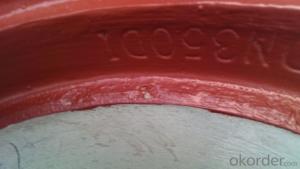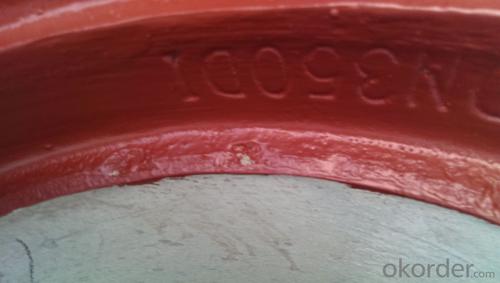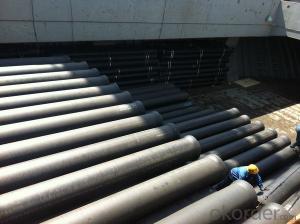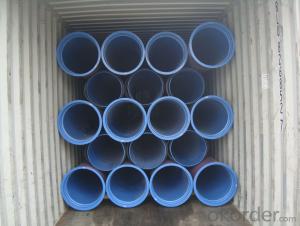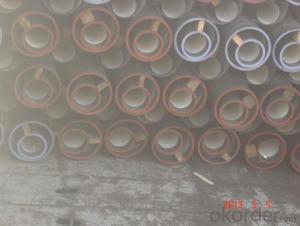T Type Ductile Iron Pipe DN400 socket spigot pipe
- Loading Port:
- Tianjin
- Payment Terms:
- TT OR LC
- Min Order Qty:
- 25
- Supply Capability:
- 30000 /month
OKorder Service Pledge
OKorder Financial Service
You Might Also Like
1) The standard of pipe: ISO2531:1998, EN545:2006,K9 K8
2) Effective length: 6m/5.7m
3) Inner cement line: Portland cement lineas per ISO4179
4) Zinc coating: at least 130g/m2 as per ISO8179
5) Bitumen painting: at least 70μm as per ISO8179
6)With 102% quantity of NBR, SBR, or EPDM ring asper ISO4633
7) DN80-DN1200
8) Highstrength, lighter than grey iron, good corrosion resistance, no furring, smallflow resistance, easy fixing, long life tome about 100 yeas
9)Checked by automatic inspection equipment
10) Composition:
Chemical composition | |||
Chemical composition | Ductile Cast Iron Pipe (%) | Grey iron pipe (%) | Steel pipe (%) |
C | 3.5-4.0 | 3.2-3.8 | 0.1-0.2 |
Si | 1.9-2.6 | 1.4-2.2 | 0.15-0.4 |
Mn | 0.15-0.45 | 0.4-0.6 | 0.3-0.6 |
P | ≤0.06 | ≤0.3 | 0.02-0.03 |
S | ≤0.02 | ≤0.1 | 0.02-0.03 |
Mg | 0.03-0.06 |
|
|
11) Feature:
Mechanical properties | |||
| Ductile Cast Iron Pipe | Grey Iron Pipe | Steel Pipe |
Tensile Strength(Mpa) | ≥420 | 150-260 | ≥400 |
Yield Strength(Mpa) | ≥300 | No Confirmation | No Confirmation |
Bending Strength(Mpa) | ≥590 | 200-360 | ≥400 |
Elongation (%) | ≥10 | Neglected | ≥18 |
Brinell Hardness(HBS) | ≤230 | ≤230 | About 140 |
12) T type mechanical joint
13) Packing: in bulk or container
PACKING: 1) Pipesare bundled together with the steel belt.
2) Wooden pieces are put between the pipes.
- Q: Can ductile iron pipes be used for underwater installations?
- Indeed, underwater installations can make use of ductile iron pipes. Ductile iron, renowned for its robustness and longevity, exhibits a remarkable resistance to corrosion, rendering it well-suited for submerged applications. Moreover, the exceptional joint integrity of ductile iron pipes guarantees their impermeability, even when subjected to substantial hydrostatic pressure. To bolster their resistance to corrosion and prolong their lifespan in underwater settings, these pipes are often coated with protective linings and coatings. All in all, ductile iron pipes are a dependable option for underwater installations due to their formidable strength, durability, and corrosion resistance attributes.
- Q: Does centrifugal cast iron pipe work well with lining cement? Will it scale and breed bacteria?
- The situation in use abroad seems. It is considered that the corrosion of the inner wall of the centrifugal centrifugal ductile iron pipe and the rupture of the pipe are easy to occur when the content of chloride ion exceeds 5O0PPm in the pipe laying environment. This is mainly because, because the cement paste protection layer is the late spraying construction, it is not good to combine with the prefabricated core tube. It often causes water or moisture to seep in and causes oxidation and corrosion of the prestressing steel bars, resulting in fracture. The adhesive interface between cement mortar and centrifugally cast iron pipe is not reasonable. Because of the water absorption of cement, when the water enters the pipe, it is easy to destroy the interface and corroded the inner wall of the centrifugally cast iron pipe. Because it is a brittle material, it is easy to cause sudden accidents.
- Q: What is the lifespan of ductile iron pipe?
- Various factors, such as pipe quality, installation environment, and maintenance practices, can influence the lifespan of ductile iron pipe. On average, this type of pipe typically lasts between 80 and 100 years. This impressive longevity can be attributed to the inherent durability and strength of ductile iron, enabling it to withstand high pressure, external loads, and environmental conditions. Moreover, ductile iron pipe is often coated with protective linings, such as cement mortar or epoxy, to enhance its resistance to corrosion and extend its lifespan. Regular inspections and maintenance also play a crucial role in prolonging the life of ductile iron pipe by promptly identifying and addressing potential issues. Ultimately, with proper installation, maintenance, and care, ductile iron pipe can provide a reliable and long-lasting service for several decades.
- Q: Are ductile iron pipes suitable for use in power plants?
- Ductile iron pipes are indeed appropriate for implementation in power plants. This material, known for its strength and durability, proves capable of enduring high pressure and temperature conditions, thus rendering it an ideal conduit for various fluids like water, steam, and chemicals within power plants. Moreover, ductile iron pipes exhibit outstanding resistance to corrosion, a critical feature for power plants frequently exposed to moisture and chemicals. Furthermore, these pipes boast an extended lifespan and necessitate minimal upkeep, thereby reducing the overall operational expenditures of power plants. All in all, ductile iron pipes provide a dependable and economically viable solution for fluid transportation within power plants.
- Q: What is the expected external coating for ductile iron pipes?
- The expected external coating for ductile iron pipes is typically a protective layer that is applied to the exterior surface of the pipe to prevent corrosion and extend its lifespan. Some common types of external coatings for ductile iron pipes include polyethylene, polyurethane, and epoxy coatings. These coatings provide a barrier between the pipe and the surrounding environment, preventing the pipe from coming into contact with corrosive substances such as soil, water, and chemicals. The choice of coating depends on factors such as the intended application, soil conditions, and the level of corrosion protection required. Overall, the expected external coating for ductile iron pipes is designed to ensure the longevity and durability of the pipes in various environmental conditions.
- Q: Are ductile iron pipes available for cutting and are there any relevant specifications?
- You can cut, there should be no specification requirements, as long as you can use, in line with the needs of the project can
- Q: Why does the construction wastewater system use ductile iron pipes instead of galvanized steel tubes?
- The cost is low, the construction cost is low, and the schedule is fast. Such as PVC, PE double wall corrugated pipes, etc..
- Q: How does ductile iron pipe compare to PVC pipe in terms of strength?
- Ductile iron pipe is generally considered to be stronger than PVC pipe. Ductile iron pipe is made of iron and carbon, which gives it a high tensile strength and resistance to breakage. It can withstand high pressures and is commonly used in heavy-duty applications such as water mains, sewer lines, and industrial piping. On the other hand, PVC pipe is made of a plastic material called polyvinyl chloride. While PVC pipe is lightweight and easy to handle, it is not as strong as ductile iron pipe. PVC pipe is typically used in low-pressure applications such as household plumbing, irrigation systems, and drainage pipes. When comparing the strength of ductile iron pipe to PVC pipe, the former has a higher capacity to handle heavy loads, withstand ground movement, and resist damage from external factors like rocks or tree roots. Ductile iron pipe is also more durable and has a longer lifespan compared to PVC pipe. However, it is important to note that the choice between ductile iron pipe and PVC pipe ultimately depends on the specific requirements of the project. Factors such as cost, environmental conditions, installation ease, and required longevity should all be taken into consideration when deciding which type of pipe to use.
- Q: What are the differences between cast iron pipes W and A?
- Cast iron drainage pipe generally divided into three categories, namely W type socket cast iron pipes, cast iron pipes of A type, B type cast iron drainage pipe, the three pipes have good seismic performance, strong sealing performance, simple construction, convenient maintenance, reliable use, so it is also called the cast iron pipe for earthquake.
- Q: What pipe can be used to replace the cast iron pipe in the water supply? Thank you
- Cast iron pipes (Cast, Iron, Pipe), cast cast pipe. Cast iron pipes are used for water supply, drainage and gas transmission lines. They include cast iron pipes and pipe fittings. Labor intensity is small.
Send your message to us
T Type Ductile Iron Pipe DN400 socket spigot pipe
- Loading Port:
- Tianjin
- Payment Terms:
- TT OR LC
- Min Order Qty:
- 25
- Supply Capability:
- 30000 /month
OKorder Service Pledge
OKorder Financial Service
Similar products
Hot products
Hot Searches
Related keywords
